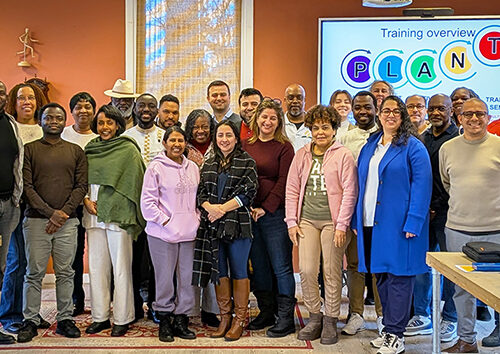11 March 2019 | London, United Kingdom [Onysha D Collins]
On 23 February 2019 in London, the South England Conference (SEC) hosted their second ‘Breaking the Trend’ event; a day of celebration and fellowship. The programme was designed to incite newness and oneness and to provide remedial solutions around issues of isolation, exclusion, and shame.
Now in its sophomore year, ‘Breaking the Trend’ was a joint effort between SEC Departments: Women’s Ministries, Men Ministries, Disability & Diversities Ministries, and Church Growth.
The day was themed ‘Creating Places of Belonging’. In the run up to the day, attendees heard phrases like ‘an opportunity to connect’, ‘a place to feel inspired’ and pleasantries of that ilk. Often the concern is that those commonly used words at Christian functions never veer beyond the nebulous to actually provide cogent practical advice. Perhaps aware of this, the team did a stellar job by heading in the opposite direction.
![Parabole Productions [Photos: Onysha D Collins] Parabole Productions1200](https://ted.adventist.org/sitenews/wp-content/uploads/2019/03/images_news-2019_Parabole_Productions1200.jpg) After beginning the day with a hearty welcome and prayer, the state of the Church was addressed through a short theatre production. Helmed by Parabole Productions, four actors took centre stage to invite the audience to assess how seemingly innocuous conversations can prove detrimental to self as well as the listener.
After beginning the day with a hearty welcome and prayer, the state of the Church was addressed through a short theatre production. Helmed by Parabole Productions, four actors took centre stage to invite the audience to assess how seemingly innocuous conversations can prove detrimental to self as well as the listener.
The scene was set with two couples engaged in gossip fodder. Energetically, they recounted the affairs of a pastor and the waywardness of a congregant’s teenager. Intermittently, each actor broke the fourth wall to address the audience with their own shortcomings and shame of being unable to deal with it. Their issues ranged from work-related stress, pornography addiction, to parental failures. A light was shone how it’s easier to talk about other people’s problems rather than our own. Met with enthusiasm from the audience, it was palpable that the skit rang true.
 The programme progressed swiftly with soothing music from L.E.G.A.C.Y Youth Choir before Pastor Rebecca Davis presented her sermon. Although she had travelled from California, Davis’s jet lag did not show since her entire presentation was laced with pert humour and scriptural depth. She began with statistics on the correlation between internet use and loneliness. As a side note, she mentioned that 17 million Brits do not have a close friend. A figure which has risen by 10% since 2013/2014. The contrast was much more profound when America was brought into the fray.
The programme progressed swiftly with soothing music from L.E.G.A.C.Y Youth Choir before Pastor Rebecca Davis presented her sermon. Although she had travelled from California, Davis’s jet lag did not show since her entire presentation was laced with pert humour and scriptural depth. She began with statistics on the correlation between internet use and loneliness. As a side note, she mentioned that 17 million Brits do not have a close friend. A figure which has risen by 10% since 2013/2014. The contrast was much more profound when America was brought into the fray.
Using Genesis 2:8, ‘It is not good for man to be alone…’ Davis proffered that when our human-shaped void is not filled, we live in isolation. Relational maladies infect us and we can suffer from loss of perspective. She further explained that we can easily forget that the enemy’s successful strategy is to isolate us so that he can destroy us. The panacea posed by Davis was ‘community’. “Community”, she said “can bring fullness of heart.” Yet, only effective if implemented Jesus’ way: no longer loving others as we love ourselves, since some people don’t even love themselves; rather to love each other as Christ loved us as stated in John 13:34.
 Davis’s rationale was that this love, in essence, creates community: for it moves beyond self-love as the exemplary standard, but points to Jesus’ self-sacrificial love. Through fully living out this command, it would usher in a messianic community equipped to change the world and be the greatest testament of Christian apologetics. Using Mark Zuckerberg, Facebook’s founder, as an example, Davis stated that Zuckerberg understood that people longed for community; they wanted to connect, to see other people and to be seen. It was one of the reasons why the social media site became so popular. However, when ranked by young adults, the Church, across the denomination spectrum, scored highly in every other section but community spirit.
Davis’s rationale was that this love, in essence, creates community: for it moves beyond self-love as the exemplary standard, but points to Jesus’ self-sacrificial love. Through fully living out this command, it would usher in a messianic community equipped to change the world and be the greatest testament of Christian apologetics. Using Mark Zuckerberg, Facebook’s founder, as an example, Davis stated that Zuckerberg understood that people longed for community; they wanted to connect, to see other people and to be seen. It was one of the reasons why the social media site became so popular. However, when ranked by young adults, the Church, across the denomination spectrum, scored highly in every other section but community spirit.
 It was a profound wake-up call, one which was addressed further in the afternoon workshops, whereby attendees learnt how to begin the process of learning how to love like Jesus. This manifested in presentations on how to spot signs of unhealthy relationships, the difference between shame and guilt, emotional intelligence, as well as exploring how Adventist men can reconcile submission to God with their masculinity.
It was a profound wake-up call, one which was addressed further in the afternoon workshops, whereby attendees learnt how to begin the process of learning how to love like Jesus. This manifested in presentations on how to spot signs of unhealthy relationships, the difference between shame and guilt, emotional intelligence, as well as exploring how Adventist men can reconcile submission to God with their masculinity.
Sophia Nicholls, the Diversity & Disabilities Ministries Director and key co-ordinator of the day, said that “the objective was to speak openly and frankly about current issues in order to develop an understanding for the need to change or for self-reflection and examination.” The feedback from the day indicated that that goal was successful as exemplified by this statement from one of the attendees, “I am compelled to go back to my Church and make a change. The morning speakers were excellent. We need more of these types of days for learning.”
tedNEWS Staff: Victor Hulbert, editor; Deana Stojković, associate editor
119 St Peter’s Street, St Albans, Herts, AL1 3EY, England
E-mail: [email protected]
Website: www.ted.adventist.org
tedNEWS is an information bulletin issued by the communication department of the Seventh-day Adventist Church in the Trans-European Division. Readers are free to republish or share this article with appropriate credit including an active hyperlink to the original article.



